For a pre-med who aspires to become a doctor, the medical college admission test (MCAT) is considered to be the most decisive moment in his life. For some, things work out smooth and they make it to their desired medical college without any hindrance. But for the most, things do not go as planned. MCAT is the most dreaded season in the calendar for the pre-meds because of the furious competition which keeps the students on their toes until they land themselves a seat into a medical college.
Suffice is to say that MCAT is something which either makes you OR breaks you! The competition is higher than ever so you must prepare well in order to beat the competition if you’re seriously considering to pursue a career in medicine. It’s hard but not impossible. Cracking the MCAT requires focus, dedication, and planning — if you have these, you’re already halfway through the journey towards your dream medical college! 🙂
READ ALSO:

MCAT Topper Balochistan 2017 (Amir Sohail’s Interview)
This is a long article, please feel free to use these page-jumps:
- MCAT in Pakistan — Competition
- General Preparation Tips for MCAT
- Subject Oriented MCAT Tips
- Online Resources for MCAT Preparation
- Best MCAT Books for MCQ Practice
- Frequently Asked Questions
MCAT in Pakistan — Competition
PUNJAB
As many as 52,272 candidates (out of which 19,730 were male and 36,542 were female) appeared in Punjab’s medical and dental colleges’ entrance test in 2016 conducted under the supervision of University of Health Sciences, Lahore. The students competed for 6900 MBBS seats (3400 in public sector and 3500 in private sector medical colleges) and 1016 BDS seats (216 in public and 800 seats in private dental colleges).
THE RESULT: 1123 students scored above 1000 marks (out of 1100) which broke the 18 years record in Punjab as reported by a local newspaper:

Another newspaper reported 1.88% increase in overall merit (compared to 2015) of medical colleges of Punjab thus the overall merit increased up to 86%, which is a matter of serious concern for all MCAT aspirants this year. Take a look at this:

The King Edward Medical University, Lahore (KEMU) as expected, remained the top choice for students from all over Punjab with a closing merit of 88.2372% while Allama Iqbal Medical College, Lahore (AIMC) remained on the second position with a closing merit of 86.4009%.
KHYBER PAKHTUNKHWA
The Educational Testing and Evaluation Agency (ETEA) — a testing service based in Peshawar reported a total of 27,513 candidates (16,791 boys and 10, 782 girls) who appeared in public and private sector medical and dental colleges of Khyber Pakhtunkhwa.
The number of seats in public sector medical colleges is around 1250.
BALOCHISTAN
An estimated 6600+ candidates from all over Balochistan appeared in the entrance test of Bolan Medical College and competed against their respective district quota for a grand total of 224 MBBS seats of the province.
The new medical colleges of Khuzdar, Turbat and Loralai are still not functional despite being approved by the government of Balochistan in 2013. These new medical colleges have their buildings constructed and teaching faculty appointed but it still appears impossible that the government will make any efforts in opening the admissions anytime soon. The delay in the commencement of the classes has put careers of many students in jeopardy!
Distribution of seats in Bolan Medical College (District Quota, Zonal Merit & Open Merit Seats):
Please click on the images to enlarge:
Bolan Medical College offers a grand total of 224 MBBS seats to students of Balochistan
THE AGA KHAN UNIVERSITY
While the Aga Khan University, being one of the elite universities of Pakistan and #1 in private sector of medical colleges accepts only 100 students each year locally and has 15 reserved seats for international students. The AKU offers international standard learning experience and a highly vibrant student life. Each year 15,000+ students appear in the entrance test of AKU from across Pakistan, out of which only 200 candidates make it to the PHASE II Interviews of the selection process and just 100 candidates successfully make it to the end.
The selection is not the only thing you should worry about… 😀 Because the Aga Khan University charges a whopping Rs. 1.8 Million PKR / annually to its students — which closes doors to a large number of students because of inadequate financial resources.
Here’s the fees structure of the Aga Khan University for session 2016-17 as seen on their university prospectus:
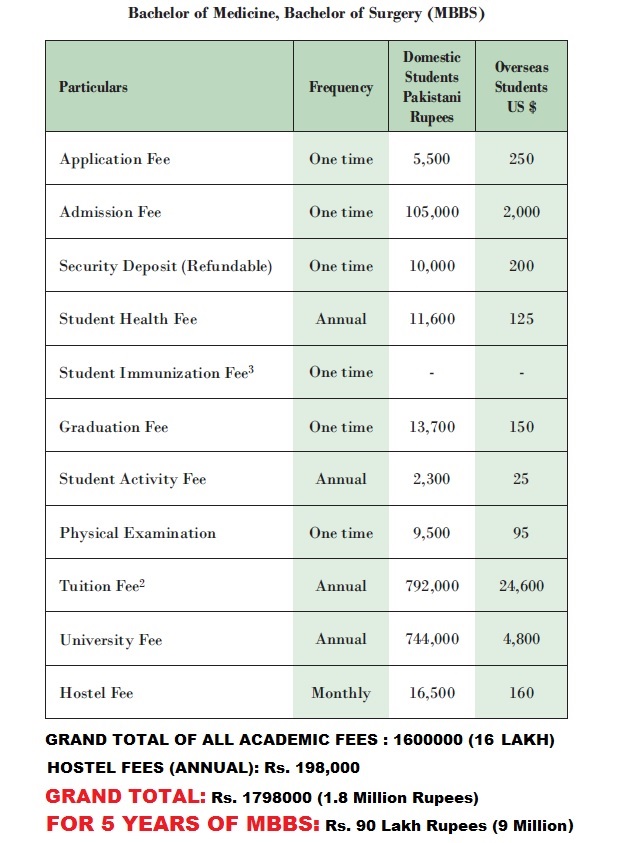
MONEY DOES NOT GROW ON TREES! 😀
Now from all the above-mentioned facts what we conclude is; the competition in MCAT is increasing at a significantly high rate with each passing year across the country. The provincial governments have literally failed to meet the educational demands of its people.
The purpose of this statistical analysis was to educate all pre-meds regarding the growing competition in MCAT in Pakistan. So if you’re planning to take the medical college entrance test this year or the up-coming, you must plan ahead and start your preparations accordingly.
General Preparation Tips for MCAT
1. Planning ahead of time:
This is the best tip that we can offer to the readers who want to score BIG in MCAT and reserve their seat into their dream medical college. The medical college admission test is a highly competitive exam and all the success stories that you read about students making it to prestigious medical institutions like the Aga Khan University, King Edward Medical University, Allama Iqbal Medical College or Dow University of Health Sciences etc — this does not happen over night. There’s a lot of struggle, hard work and straight sleepless nights behind the picture that has lead to such great success!
So, if you’re serious about getting admission into a well-ranked public sector medical institute, you must plan ahead of time. You MUST NOT wait for the last 3-2 months because good MCAT preparation requires a lot of time. And according to many of the high achievers, the ideal time required for good MCAT preparation is 5-6 months which is enough for having a good command over the subjects, practicing MCQs and revisions.
But from the personal standpoint, the think the best time for preparing for MCAT is when you start your college education. This is a time if utilized well can yield remarkable results in MCAT. So, if you’re still in college then you are already in a good position to start with. You must start studying in a way as if you’re preparing for your medical college entrance exam.
Make a schedule and stick to it. This will help you score big and thus you will easily be able to keep the competition at bay! 🙂
2. Eliminate your weaknesses and build your core concepts
It is highly advised that for a good MCAT preparation, you must first identify your weak areas and improve them by spending ample time so that you get rid of any inadequacy in your preparation.
And always remember this: MCAT is way different from FS.c! Yes, you heard that right.
Unlike FS.c (which mostly involves cramming), the MCAT is more of a conceptual thing and requires technique. You must focus on building your core concepts for all three major subjects in order to stay a head of the competition.
3. Strengthen your preparation by practicing MCQs and course revision
I remember one of my teachers telling us:
“Practice makes you perfect and revisions make that perfection stay.”
Practicing MCQs is a way to test and strengthen your knowledge and is a pro-tip when it comes to MCAT preparation. There is no substitute for practicing, period!
Course revisions are important in order to replenish what you have forgotten. You must solve as many MCQs as you can regarding a topic once you complete it. This helps you make assessments regarding your learning and helps you overcome your weaknesses. And always schedule weekly mock tests and subject yourself to test-day like conditions so that you’re well prepared psychologically for the exam.
4. Read from the MCAT books along with your course books
The MCAT books have content structured in a way keeping in mind the test format. These books are highly exam-oriented and contain high-yield important topics that are frequently tested in the exam. They have more of a conceptual approach towards important topics and they also come up with BRAIN BUSTERS and related MCQs (found at the end of each topic), which are a great way to master important topics.
Subject Oriented MCAT Tips
PHYSICS:
Pre-meds are often scared by the fat looking Physics and Chemistry books which is not true because they really are shorter when compared to Biology. They appear long because of the worked out numerical problems spread over multiple pages thus creating a false image. But honestly, they can be revised more than three times easily if you stick to your schedule and work hard.
What you simply have to do is to concentrate on building your core concepts, understand and memorize formulas, equations, and relationships between variables. Because the whole concept pertaining to a law is summarized in a single line of the equation. Beautiful! Isn’t it? 🙂
CHEMISTRY:
This subject is somewhat tricky and requires more time if compared to Physics because a thorough and conceptual understanding of its theory and numerical problems is required in order to master it. So, instead of considering one book, I will suggest that you consider two: FS.c and A-Level books. Make one of them your main book depending on which one you’re more familiar with and highlight definitions, formulas, equations and important points on it. And once you’re done with the main book, now start reading from the other book and import important points from it that are missing in your main book. This way, you will be able to revise both when you’re doing your final revision from your main book.
Chemistry is divided into three portions:
- Analytic Chemistry: Here you need to focus on practicing numerical like physics, memorize formulas and equations. And try solving as many MCQs as you can, testing your knowledge in this area will help you improve.
- Organic Chemistry: For this portion, you must focus on understanding and not memorization (a.k.a RATTA). Practice as many problems/quizzes as you can as this will help you improve your concepts. And work on learning relationships between properties (i.e pKa, polarity and how hydrocarbon chain length affects the boiling point etc).The topic of “Nucleophilic Substitution (SN1, SN2) Reactions” are also very important from the test point of view.
- Inorganic Chemistry: Memorize the periodic table (this is a MUST TO DO because it is high yield and is often tested in MCAT) and not just the position and arrangement of the elements but also try understanding “groups” and “periods” as well because they give a lot of information regarding the atomic structure, electron shells and reactivity. Once you master the periodic table, you will easily understand the individual behavior of an element. What I’m trying to say here is that you should study the whole of the inorganic chemistry, especially the important topics and practice as many MCQs as you can in order to strengthen your preparation.
If you’re from Punjab, then you must read UHS MCAT Syllabus and prepare accordingly.
BIOLOGY:
We all know that Biology is the most tested subject in MCAT which is great because not only Biology is fun and easy to study but can also help you achieve a high MCAT score. You should do extensive reading and revisions combined with the practice of MCQs (as many as you can) in order to master this subject.
The important areas of Biology that are mostly tested in medical college admission test are:
- Cell Biology
- Biological Molecules
- Evolution & Genetics
- Human Physiology
- Bio-energetics
- Reproduction
- Kingdom Animalia
- Ecosystem
CONCLUSION:
The MCAT is race, a marathon with a path full of difficulties and struggles but let me tell you this; the view that you’re going to get once you are at the finish line is beautiful and is worth the struggle that you’re going through now! 🙂
The great Muhammad Ali said:
“Don’t quit. Suffer now and live the rest of your life as a champion.”
And remember this:

GOOD LUCK EVERYONE! 🙂
Online Resources for MCAT Preparation
The KhanAcademy.Org
Khan Academy is the best online resource which you can use to prepare for MCAT (and they charge NOTHING at all!) They offer free video lectures covering all important areas of MCAT with 500+ exercises to help you take your preparation to the next level!
Best MCAT Books for MCQ Practice
Here are a few highly rated MCAT books (available in downloadable .pdf format) that you can use for your preparation. They contain only the MCQs which you may use for practice:
**Please click on the download links to download the books**
BIOLOGY MCAT BOOKS
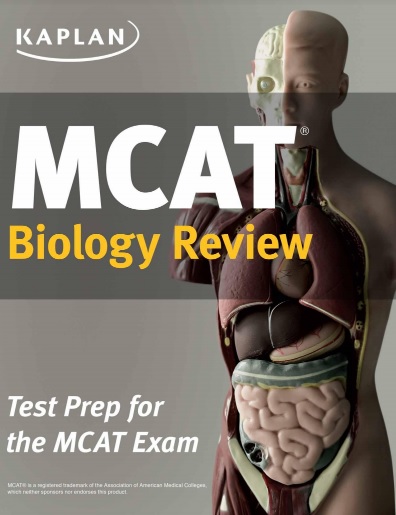
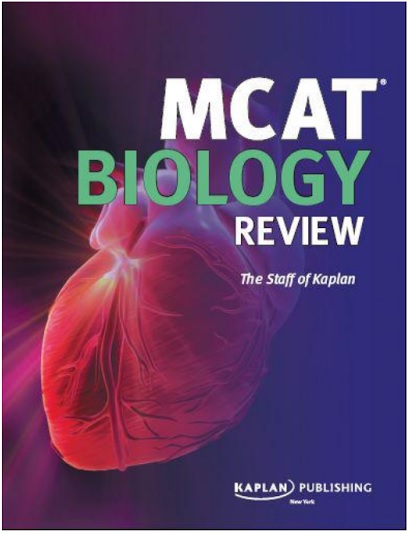
Click here to download Click here to download
ORGANIC CHEMISTRY MCAT BOOKS
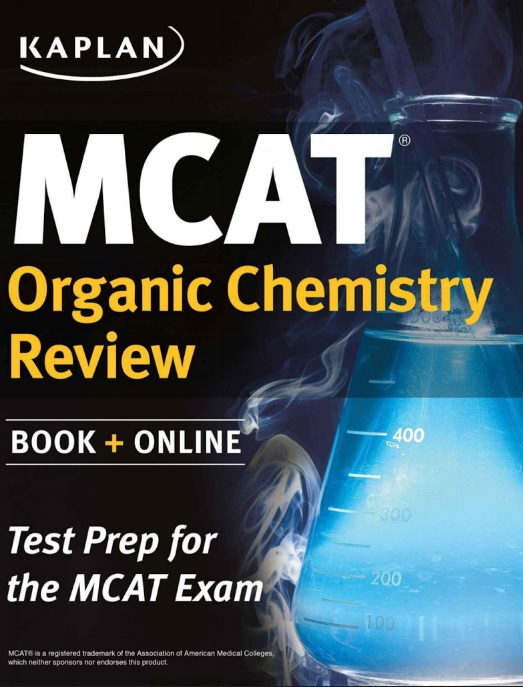
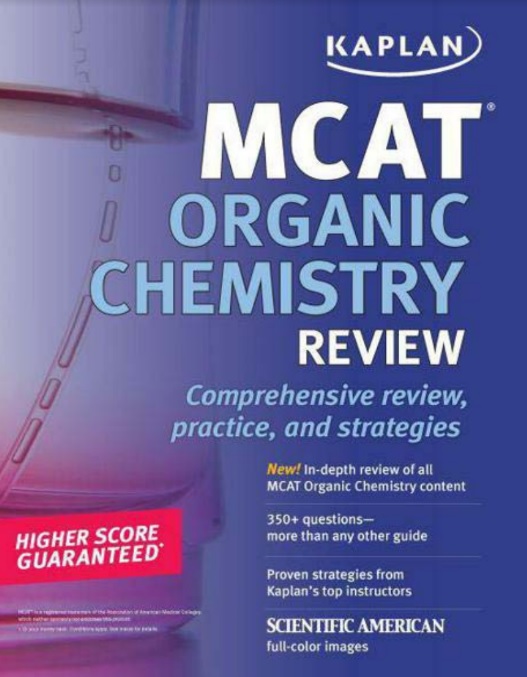
Click here to download Click here to download
GENERAL CHEMISTRY MCAT BOOKS
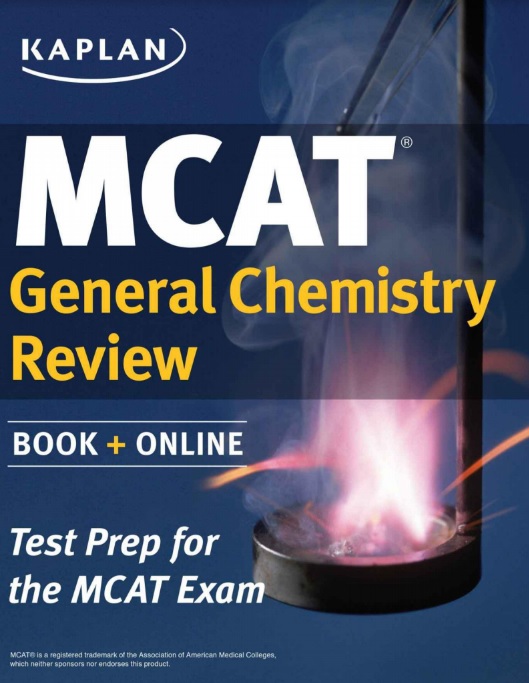
Click here to download
PHYSICS MCAT BOOKS
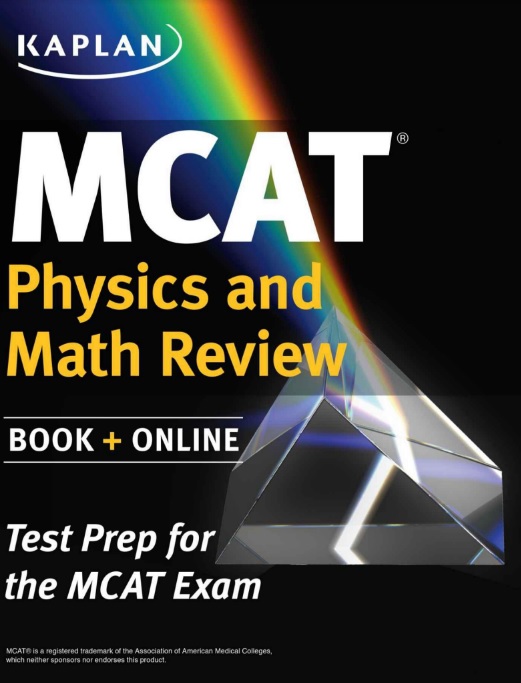
Click here to download
Frequently Asked Questions:
Here are a few frequently asked questions regarding MCAT preparation:
Q: Which subject should be given more time?
Ans: Well, it all comes down to your own strengths and weaknesses concerning the major subjects i.e Physics, Chemistry and Biology. In our opinion, you must spend more time and attention to the subject that is more difficult for you compared to the one you’re strong at. And one more thing, DO NOT fall into the trap of thinking that you will spend give more time to the subject which makes up most of your test (in terms of numbers of MCQs). All subjects are equally important. Period!
Your shortcoming in one subject can drastically decrease your chances of succeeding in MCAT! So please be very careful.
Q: How much should I study for MCAT every day?
Ans: Well, it’s all up to you — it depends on how effectively you can utilize your time by focused and target oriented studying. And most importantly, it depends on your level of mastery for each subject and concerning this aspect, then the recommended time span to be spent studying differs from person to person.
Do not confuse yourself with such redundant questions. Do a quick self-assessment of yourself and then pace yourself accordingly. Set targets for each day and direct all your focus and energy in accomplishing them.
Q: What’s best: to study one subject at a time till it’s completed or study all three simultaneously?
Ans: Do not get yourself tired by focusing only on one subject at a time waiting for it’s completion so that you would switch to the next. This is not considered as a good practice when it comes to preparing for MCAT. It will make you feel exhausted, bored and demotivated and for some, this triggers panic attacks because they start feeling that they’re lagging behind in the rest.
The best way to do is to start all three at once, set timings for each subject in your daily study schedule such as morning for biology, noon for physics and evening for chemistry or whatever that suits you. This way you won’t feel exhausted and you will complete all three subject together. This will give you piece of mind and satisfaction! 🙂
Please let us know if you have any questions. You may leave your questions/comments below in the comment section. Thank you! 🙂

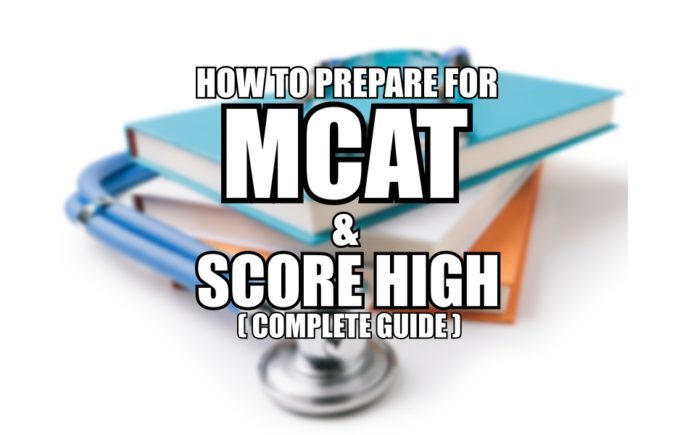
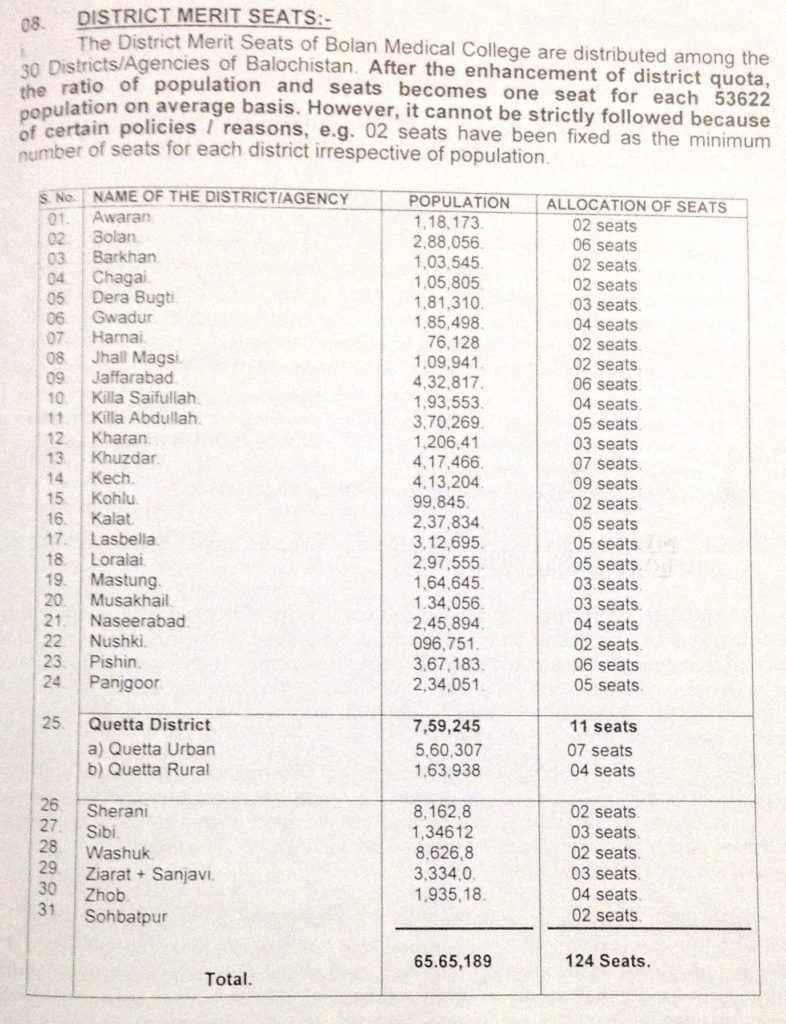
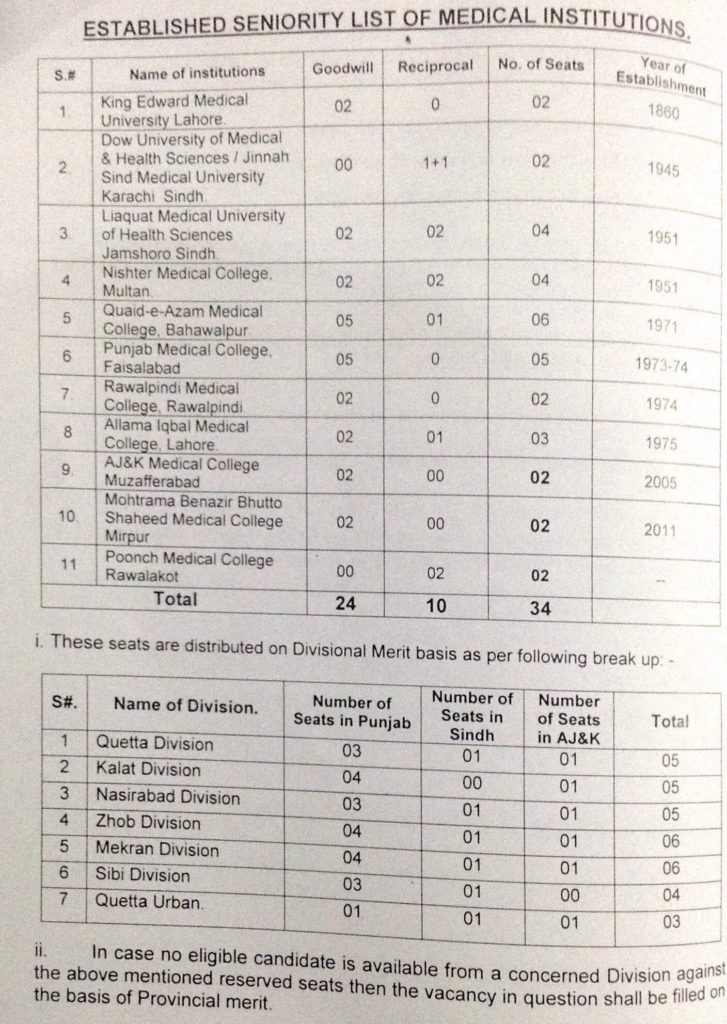
![Kaplan MCAT Physics and Math Review 2021-2022: Online + Book PDF Free Download [Direct Link] Kaplan MCAT Physics and Math Review 2021-2022 Online + Book PDF](https://www.medicosrepublic.com/wp-content/uploads/2023/01/Kaplan-MCAT-Physics-and-Math-Review-2021-2022-Online-Book-PDF-Free-Download-218x150.jpg)
![Kaplan MCAT Biology Review 2021-2022: Online + Book PDF Free Download [Direct Link] Kaplan MCAT Biology Review 2021-2022 Online + Book PDF](https://www.medicosrepublic.com/wp-content/uploads/2023/01/Kaplan-MCAT-Biology-Review-2021-2022-Online-Book-PDF-Free-Download-218x150.jpg)
![Kaplan MCAT Biochemistry Review: Created for MCAT 2015 PDF Free Download [Direct Link] Kaplan MCAT Biochemistry Review Created for MCAT 2015 PDF](https://www.medicosrepublic.com/wp-content/uploads/2023/01/Kaplan-MCAT-Biochemistry-Review-Created-for-MCAT-2015-PDF-Free-Download-218x150.jpg)
![Kaplan MCAT 528 Advanced Prep 2019-2020: Online + Book PDF Free Download [Direct Link] Kaplan MCAT 528 Advanced Prep 2019-2020 Online + Book PDF](https://www.medicosrepublic.com/wp-content/uploads/2023/01/Kaplan-MCAT-528-Advanced-Prep-2019-2020-Online-Book-PDF-Free-Download-218x150.jpg)
![Kaplan MCAT General Chemistry Review 2021-2022: Online + Book PDF Free Download [Direct Link] Kaplan MCAT General Chemistry Review 2021-2022 Online + Book PDF](https://www.medicosrepublic.com/wp-content/uploads/2023/01/Kaplan-MCAT-General-Chemistry-Review-2021-2022-Online-Book-PDF-Free-Download-218x150.jpg)
![Kaplan MCAT Biology Review 2019-2020: Online + Book PDF Free Download [Direct Link] Kaplan MCAT Biology Review 2019-2020 Online + Book PDF](https://www.medicosrepublic.com/wp-content/uploads/2023/01/Kaplan-MCAT-Biology-Review-2019-2020-Online-Book-PDF-Free-Download-218x150.jpg)






![Gerstmann Syndrome Features Mnemonic [Easy-to-remember] Gerstmann Syndrome Features Mnemonic](https://www.medicosrepublic.com/wp-content/uploads/2025/06/Gerstmann-Syndrome-Features-Mnemonic-150x150.jpg)
![Cerebellar Signs Mnemonic [Easy to remember] Cerebellar Signs Mnemonic](https://www.medicosrepublic.com/wp-content/uploads/2025/06/Cerebellar-Signs-Mnemonic-150x150.jpg)
![Seizure Features Mnemonic [Easy-to-remember] Seizure Features Mnemonic](https://www.medicosrepublic.com/wp-content/uploads/2025/06/Seizure-Features-Mnemonic-1-150x150.jpg)

![Recognizing end-of-life Mnemonic [Easy to remember]](https://www.medicosrepublic.com/wp-content/uploads/2025/06/Recognizing-end-of-life-Mnemonic-150x150.jpg)

![Multi-System Atrophy Mnemonic [Easy-to-remember] Multi-System Atrophy Mnemonic](https://www.medicosrepublic.com/wp-content/uploads/2025/06/Multi-System-Atrophy-Mnemonic-150x150.jpg)

![How to Remember Southern, Northern, and Western Blot Tests [Mnemonic] How to Remember Southern, Northern, and Western Blot Tests](https://www.medicosrepublic.com/wp-content/uploads/2025/06/How-to-Remember-Southern-Northern-and-Western-Blot-Tests-150x150.jpg)










THANK YOU
Yar please stop saying that MCAT is conceptual! Its a white lie MCAT is all craming u should try a level mcqs then better decide yourself are you really on your point that MCAT is all conceptual?
I have seen that all the mcqs are actually from fsc books. And guys let me explain u that by just simply changing words you can’t make anything conceptual.
Well, here in Balochistan, we have an MCAT that is very much conceptual (though NTS does not produce any genuine MCQs of its own and copies stuff directly from Kaplan, Princeton and Barron’s).
I am not sure about rest of the country but there’s one thing for sure, conceptual learning is highly productive, yields more and helps reinforcing the learned knowledge for a longer period of time.
You cannot cram everything!
in sindh .. lumhs university which book are best?
Those books are not available on that link…can u please checke if the link is correct or not?